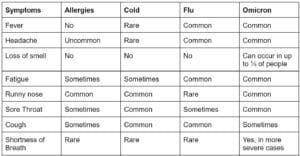You’ve had a cough and sniffles for over a week. COVID-19 rapid antigen and PCR tests were negative. What else might be causing your symptoms?
Although we’ve all become acutely aware of SARS-CoV-2, the coronavirus which causes COVID-19, other coronaviruses have been with us throughout human history, often presenting as common colds. Symptoms of COVID-19 overlap with colds, the flu, and even seasonal allergies, and differentiating between the myriad causes of a respiratory illness can be challenging. Shared symptoms include runny nose, fatigue, cough, headache, and sore throat. Loss of taste or smell, however, is unique to COVID-19 and is atypical of other respiratory illnesses.
Respiratory viruses such as the flu tend to be seasonal, peaking in the winter in the northern hemisphere (September to April). In people who are ill enough to require hospitalization, respiratory panels are run which include multiple pathogens, such as influenza, adenovirus, parainfluenza, respiratory syncytial virus (RSV), human metapneumovirus, and rhinovirus. However, in adults not sick enough to require hospitalization, the main viruses of concern are influenza and SARS-CoV-2.
Influenza, ‘the flu’, usually presents with a rapid onset of fever, cough, and body aches and should be suspected when there is an outbreak in the community. Similar to COVID-19, the preferred test is a molecular assay (nucleic acid amplification test), which can detect very small amounts of virus and is highly sensitive and specific, meaning it has a low percentage of incorrect test results. The conventional reverse transcription polymerase chain reaction (RT-PCR) assay takes ~ 1-8 hours and can distinguish between influenza A and B and subtypes of A. Rapid molecular tests can distinguish between influenza A and B but cannot differentiate subtypes of A. Rapid molecular influenza tests are more practical in an urgent care or emergency setting as results are back in ~ 15-30 minutes. Finally, multiplex RT-PCR are tests that can simultaneously check for many respiratory influenza, SARS-CoV-2, and bacterial pneumonia, among others.
Below is a table outlining common differences between allergies, a cold, the flu, and the Omicron variant of SARS-CoV-2. As new variants emerge, symptoms of COVID-19 will continue to evolve. If your symptoms are worsening and you have concerns, please contact your healthcare provider for advice.
